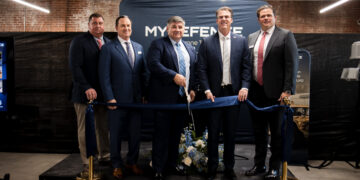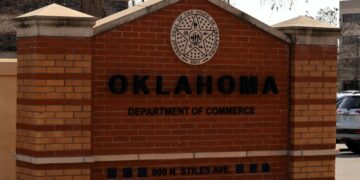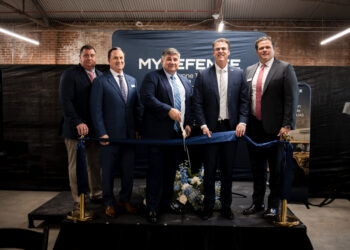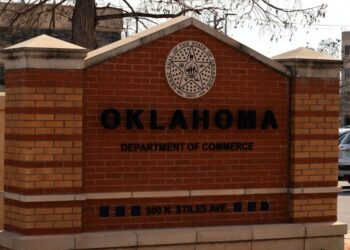OKLAHOMA CITY (OBV) – Gov. Kevin Stitt set the date for a statewide vote on State Question 832, the ballot initiative to raise Oklahoma’s minimum wage.
The vote on SQ 832 will be on June 16, 2026, which is the first statewide election after the upcoming general election on Nov. 5.
“Consistent with state law, Secretary [of State Josh] Cockroft and the State Election Board recommended the next possible statewide ballot, which would be the June 2026 statewide primary,” Stitt said in a statement released by his staff to Oklahoma Business Voice. “This choice saves taxpayers over $1.8 million and prevents the need for the Election Board to request supplemental funding from the Legislature to arrange a standalone statewide election.”
SQ 832 failed to meet the governor’s Aug. 26 deadline to place the question on the November ballot. The ballot initiative was still in the signature and ballot title protest period at that time, meaning it was still in the Oklahoma Supreme Court’s purview rather than in Stitt’s hands.
The Oklahoma Secretary of State’s office verified the petition signatures in August to get SQ 832 on the ballot.
SQ 832 supporters delivered dozens of boxes filled with nearly 180,000 signatures from across the state in support of raising the minimum wage to the Secretary of State’s Office in July. The signatures were collected throughout the state by Oklahomans who support raising the state’s minimum wage.
SOS officials verified 157,287 of the signatures, according to Will Milam, counselor to Cockroft. The ballot initiative needed 92,263 signatures to qualify for placement on a state ballot.
Oklahoma’s current minimum wage – the same as the federal minimum wage – is $7.25 per hour.
State Question 832 seeks to amend the Oklahoma Minimum Wage Act and increase the minimum wage by untying the state from the federal minimum wage. The amendment, if approved, would require employers to pay employees at least $9 per hour beginning in 2025, $10.50 per hour beginning 2026, $12 per hour beginning in 2027, $13.50 per hour beginning in 2028 and $15 per hour beginning in 2029. The wage will increase with the cost of living, beginning in 2030, as measured by the U.S. Department of Labor’s Consumer Price Index for Urban Wage Earners and Clerical Workers (CPI-W).
The State Chamber of Oklahoma and the Oklahoma Farm Bureau oppose the ballot initiative, having previously challenged SQ 832 in the Supreme Court.
“I was a little bit surprised that [the vote will be] in 2026, but it doesn’t really matter for us when the vote is on the ballot – we’re going to be opposed to it,” said State Chamber President & CEO Chad Warmington. “I think it’s bad policy for Oklahoma, particularly the portion that ties it to the consumer price index. But again, just overall, we’re going to be opposed to it, whether it’s next year or in 2026.”
Warmington said he is not opposed to discussing raising the minimum wage to a market-driven wage.
“I think we’ve talked to consultants and economists who think [the market-driven wage] is in the $10-12 an hour range. So, we wouldn’t be opposed to that conversation if the legislature chose to want to do that,” Warmington said. “But again, taking it to $15 and then tying it every year to an increase based on CPI, which is based on inflation in New York and California, is a bad policy for Oklahoma.”
Amber England, campaign spokesperson for Raise the Wage Oklahoma, said in July that many Oklahomans struggle to earn a living wage.
“We just know that it makes common sense that when gas, groceries and housing keep going up, that wages should too. Oklahoma ranks 47th in the number of low wage workers in the country. And because our minimum wage hasn’t been raised since 2009 – that’s 15 years – wages are actually kept low. The floor for low wages is kept really, really low because our state’s minimum wage is $7.25 an hour,” England said.
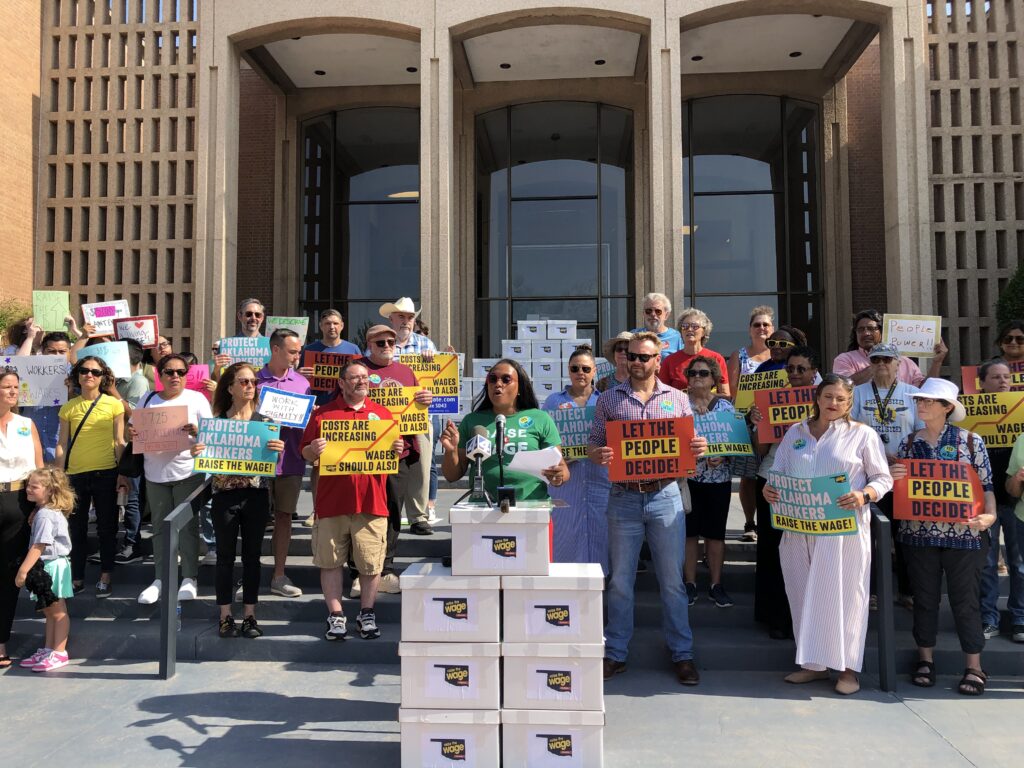
Proponents of SQ 832 contend that the current state minimum wage has stayed the same for years and it is not a sustainable wage in 2024.
Bureau of Labor Statistics data shows that a large percentage of Oklahoma workers already earn above the current minimum wage.
Oklahoma Business Voice spoke with OESC officials in May, seeking data on how many Oklahomans are making above or below the minimum wage. OESC officials provided OBV a Bureau of Labor Statistics report published in August 2023 and BLS’ Occupational Employment and Wage Statistics (OEWS) program.
The Sooner State had an estimated 935,000 hourly wage earners in 2022. The hourly pay for those workers – excluding overtime pay, tips and commissions – breaks down as follows:
- Above the federal minimum wage: 922,000 (98.6 percent)
- At the federal minimum wage: 1,000 (0.1 percent)
- Below the federal minimum wage: 12,000 (1.3 percent)
The average hourly wage in Oklahoma is $25.70 an hour, according to BLS’ OEWS data. But the average includes high-paying jobs such as chief executives, who earn an average of $76.07 an hour, public relations managers, who earn an average of $53.91 an hour, human resources managers, who earn an average of $58.75 an hour, and nurse practitioners, who earn an average of $59.77 an hour.
Occupations with lower hourly wages in Oklahoma include floral designers (average of $12.88 an hour), lifeguards ($11.33), fast food cooks ($12.12), bartenders ($12.34), fast food and counter workers ($11.64), waiters/waitresses ($11.82), non-restaurant food servers ($12.27), dining room and cafeteria attendants and bartender helpers ($12.05), dishwashers ($12.19), restaurant, lounge and coffee shop hosts and hostesses ($11.60), gambling dealers ($11.50), gambling and sports book writers and runners ($12.98), ushers, lobby attendants and ticket takers ($10.76), amusement and recreation attendants ($11.17), locker room, coatroom and dressing room attendants ($10.89), barbers ($11.71), shampooers ($10.11), baggage porters and bellhops ($11.45), childcare workers ($12.51) and hotel, motel and resort desk clerks ($12.63).
Nineteen other states besides Oklahoma have a $7.25 hourly minimum wage, including Alabama, Georgia, Idaho, Indiana, Iowa, Kansas, Kentucky, Louisiana, Mississippi, New Hampshire, North Carolina, North Dakota, Pennsylvania, South Carolina, Tennessee, Texas, Utah, Wisconsin and Wyoming. The Northern Mariana Islands also has a $7.25 minimum wage, according to the National Conference of State Legislatures.
England said inflation is hitting working families hard and that approximately 320,000 Oklahomans earn below $15 an hour.
“I think if folks believe that most people are making above $15 an hour, they’re just not really looking at the data and they’re likely out of touch and don’t understand what it’s like to be a struggling person trying to make it in today’s world,” she said.
The State Chamber of Oklahoma and Oklahoma Farm Bureau jointly filed a legal challenge in the Oklahoma Supreme Court against SQ 832 in November, arguing that the state question is unconstitutional under Oklahoma law because it unlawfully delegates the legislature’s power to federal administrative officials.
The proposed minimum wage increase does not jibe with Oklahoma’s cost of living, Warmington said.
“State Chamber member companies have no interest in artificially holding down wages, and in today’s labor market, they could not stay in business if they tried to do so,” Warmington said. “Let’s be clear, most of our members already pay well above the current minimum wage hourly rate to their non-salaried employees. What is a major concern to us is the automatic, open-ended increase being linked to a federal government produced index that is based upon cost-of-living rates in cities like New York or San Francisco. Those areas are not reflective of the actual cost of living in Oklahoma.”
The Supreme Court voted 7-2 in early March to allow the ballot initiative to stand, saying, “Initiative Petition No. 446 does not clearly or manifestly violate either the Oklahoma or United States Constitution.” However, the court did not provide a majority opinion clarifying the ruling.
The court also did not provide clarification on why they rejected the petition for a rehearing.
The Chamber and Farm Bureau jointly petitioned for a rehearing on SQ 832, but the Supreme Court denied the petition.




